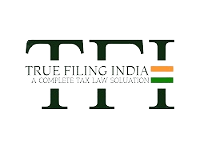Proprietorship Registration including GST and Udyam Registration.
- GST Registration
- Udyam Registration
Invoicing, GST Filing, Banking and Payroll |
Zero Account Maintenance Charges for 1 Year* |
GST Invoice Get GST eInvoice with Input Tax Credit |
What is Proprietorship
Sole Proprietorship is arguably one of the most popular business structures in India. Unlike other companies, it adheres to minimal compliances that make the business journey more seamless. It is a kind of business structure where one person is responsible for handling the entire business affair. Sole Proprietorship doesn’t allow outsiders to intervene in the business proceeding or any other aspects unless the owner wishes them to do so.
Benefits of a Sole Proprietorship Firm
Every business structure renders different benefits. Following are some notable benefits offered by a Sole Proprietorship Business to its owner
Fairly Easy To Establish
An applicant seeking to run their business affairs as a Sole Proprietor doesn’t need to undergo any registration process. They only need to secure business-specific licenses or registrations to run their business legally.
less Investment
Since the Sole Proprietorship model is a boon for low-cost business ideas, it is often chosen by small businesses like retail shop outlets, grocery retailers, so on and so forth.
Incorporation of business structure like a private limited company, OPC seeks significant expenditure in terms of capital procurement, which otherwise is nil in the case of the Sole Proprietorship model.
Ensures no profit distribution
The sole proprietors serve as the sole owner of their business and rejoice uncompromised control over their profit.
Easy compliances
The Sole Proprietorship business model doesn’t come under the ambit of any specific law; hence, it is free to operate without tedious compliances. Unlike entities functioning under Company Act, 2013, they are free to work without a Certificate of Incorporation or Registration Certificate. Also, they are not obligated to disclose annual reports with MCA. However, such businesses need to stay in line with applicable GST compliances. In view of this, they are also mandated to register under the prevailing GST Act.
Attract lower Taxes
Tax authority doesn’t treat Sole Proprietorship and Sole proprietor differently. Therefore, they do not need to address separate tax liabilities. Prevailing IT Act mandates sole proprietor to file an income tax return. It is a way to disclose profit and income generated before the tax authority for the given FY.
Please remember that tax estimation is done as per the income tax slab rates as applicable to the taxpayer. Therefore, there is no requirement of filing a separate tax return for the Sole Proprietorship firm.
No Auditing requirement for low income firm
The financial accounts of Sole Proprietor business are not exposed to mandatory auditing requirements. It only comes into play when a business income surpasses the certain turnover threshold underpinned by the concerned authority.
CALL A FREE CA CS AND CORPORATE LAWYER 24*7
Checklist of Documents required to operate as an Sole Proprietor
- PAN, photographs, &Aadhar Card of the proprietor
- Utility bill of the business place such as water bill or electricity bill
- Bank statement copy and other details such as account number and IFSC code
- Applicants can avail of GST registration by submitting relevant e-application on the GST portal.
Register under GST
GST registration applies to all forms of business whose annual turnover is above the prescribed threshold limit. At present, businesses whose yearly turnover is greater than Rs 40 lakh are mandated to secure this registration. Keep in mind that GST also covers online business owners.
Compliances for Proprietorship
The following are some of the compliances that are applicable for a sole proprietorship:
Income Tax Filing: The business owner of a proprietorship will have to file personal income tax return using form ITR-3 or ITR-4.
Business Income: Only income tax forms ITR-3 and ITR-4 allow for declaring business income. Hence, all proprietorships will have to file form ITR-3 or ITR-4 to be compliant with the income tax regulations.
GST Return Filing: If a proprietorship has GST registration, GST return must be filed every month and quarter as per the scheme under which the business is registered.
TDS Returns: In case the proprietorship is having employees or purchasing goods/services beyond a certain threshold – tax must be deducted at source and TDS returns must be filed every quarter.
In addition to the above, various other compliance requirements maybe applicable to the proprietorship based on industry and location.



